#nuremberg trials
Text
Greg Reese Report 👇
The Illegal Kidnapping and Persecution of Reiner Fuëllmich. The internal coup to sabotage the Second Nuremberg trials. 🤔
#pay attention#educate yourselves#educate yourself#knowledge is power#reeducate yourself#reeducate yourselves#think about it#think for yourselves#think for yourself#do your homework#do some research#do your own research#ask yourself questions#question everything#greg reese report#greg reese#news#nuremberg trials#world news
190 notes
·
View notes
Text
During Nuremberg Trial testimony, the prosecutor pressed Einsatzgruppen commander Otto Ohlendorf: “You were going out to shoot down defenseless people. Now, didn’t the question of the morality of that enter your mind?” Ohlendorf referred to the Allied bombings of Germany as a context:
I am not in a position to isolate this occurrence from the occurrences of 1943, 1944, and 1945 where with my own hands I took children and women out of the burning asphalt myself, and with my own hands I took big blocks of stone from the stomachs of pregnant women; and with my own eyes I saw 60,000 people die within 24 hours.
A judge immediately pointed out that his own killing spree preceded those bombings. But this would become known as the “Dresden defense,” to which Ohlendorf resorted still another time, in this exchange:
Ohlendorf: I have seen very many children killed in this war through air attacks, for the security of other nations, and orders were carried out to bomb, no matter whether many children were killed or not.
Q: Now, I think we are getting somewhere, Mr. Ohlendorf. You saw German children killed by Allied bombers and that is what you are referring to?
Ohlendorf: Yes, I have seen it.
Q: Do you attempt to draw a moral comparison between the bomber who drops bombs hoping that it will not kill children and yourself who shot children deliberately? Is that a fair moral comparison ?
Ohlendorf: I cannot imagine that those planes which systematically covered a city that was a fortified city, square meter for square meter, with incendiaries and explosive bombs and again with phosphorus bombs, and this done from block to block, and then as I have seen it in Dresden likewise the squares where the civilian population had fled to—that these men could possibly hope not to kill any civilian population, and no children.
Ohlendorf thought this defense so powerful that he invoked it yet another time:
The fact that individual men killed civilians face to face is looked upon as terrible and is pictured as specially gruesome because the order was clearly given to kill these people; but I cannot morally evaluate a deed any better, a deed which makes it possible, by pushing a button, to kill a much larger number of civilians, men, women, and children.
(The chief prosecutor, an American, called this particular iteration “exactly what a fanatical pseudo-intellectual SS-man might well believe.”)
At Nuremberg, this sort of tu quoque defense (“I shouldn’t be punished because they did it too”) wasn’t admissible. Still, in the verdict of the Einsatzgruppen Trial, the judges chose to refute it. “It was submitted,” the judges wrote, “that the defendants must be exonerated from the charge of killing civilian populations since every Allied nation brought about the death of noncombatants through the instrumentality of bombing.” The judges would have none of it:
A city is bombed for tactical purposes… it inevitably happens that nonmilitary persons are killed. This is an incident, a grave incident to be sure, but an unavoidable corollary of battle action. The civilians are not individualized. The bomb falls, it is aimed at the railroad yards, houses along the tracks are hit and many of their occupants killed. But that is entirely different, both in fact and in law, from an armed force marching up to these same railroad tracks, entering those houses abutting thereon, dragging out the men, women and children and shooting them.
The tribunal sentenced Ohlendorf to death. He was hanged in June 1951.
“In the last analysis”
Nuremberg enforced a fundamental distinction. All civilian lives are equal, but not so all ways of taking them. The deliberate and purposeful killing of civilians is a crime; not so the taking of civilian lives that is undesired, unintended, but unavoidable. The errors made by a bomber squadron cannot be deducted from the murders committed by a death squad. It’s a difference compounded many times over when those civilian men, women, and children are subjected to torture, rape, and mutilation before their murder. To borrow Khalidi’s phrase, “in the last analysis,” this distinction is what separates modern civilization from its predecessors.
More disturbing is the thought that it separates the contemporary West from its peers. Otto Ohlendorf and the regime he served did all they could to conceal their deeds from Western eyes. Nazi Germany still operated in a West founded on Enlightenment values. So massive a violation of a shared patrimony needed to be hidden from view.
In contrast, Hamas initially sought to publicize its deeds, assuming they would win applause, admiration, or at least tacit acceptance in the Arab and Muslim worlds. Here they succeeded beyond their expectations. The many millions who don’t share the West’s patrimony, and who know next to nothing about the Holocaust or Nuremberg, do see things as Khalidi says they see them. (So, too, does a sliver of alienated opinion in the West, where such views are cultivated and celebrated.)
Finally, and still more disturbing, is the fact that Ohlendorf’s defense has been revived to frame the massacre of Jews.
#Hamas#Palestine#Nuremberg trials#Dresden defense#Israel#leftist antisemitism#jumblr#war crimes#genocide#crimes against humanity
155 notes
·
View notes
Text
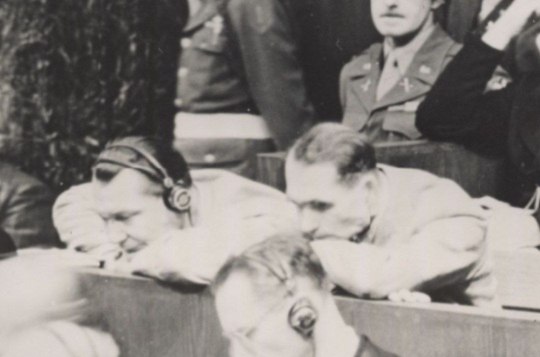
47 notes
·
View notes
Text
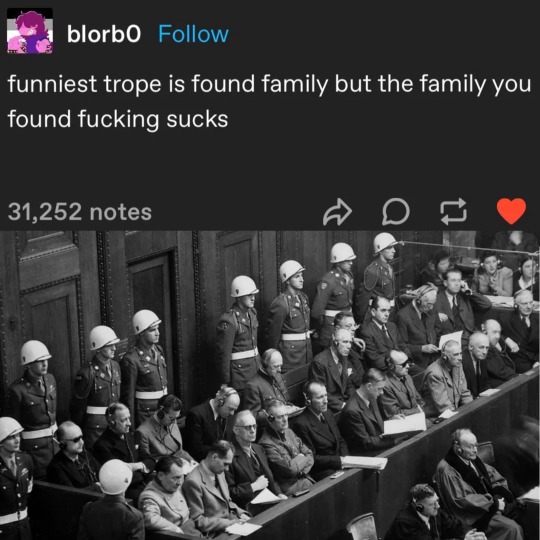


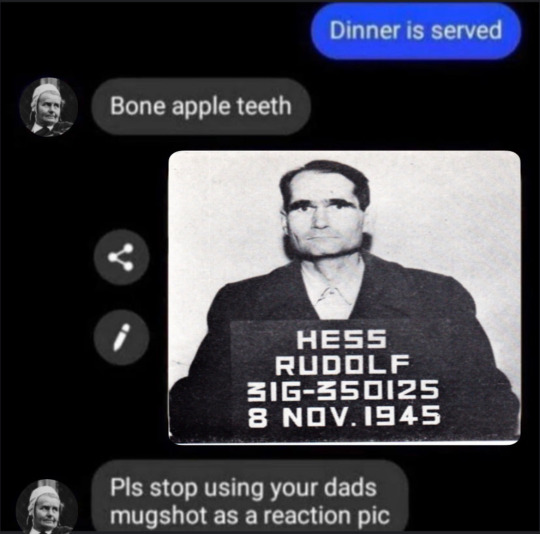
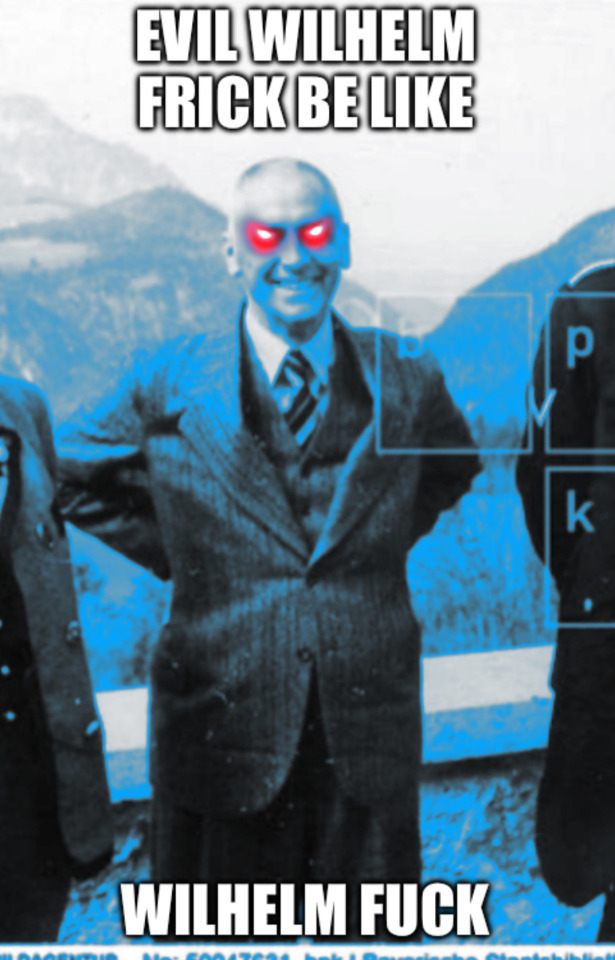

Some stupid shit I made because I haven’t bothered to write more educational content
63 notes
·
View notes
Text
DEADLY V🧛🏿♂️A🧛🏿♂️C🧛🏿♂️C🧛🏿♂️I🧛🏿♂️N🧛🏿♂️E 🧛🏿♂️TRIALS🧛🏿♂️
🧟♀️🧛🏿♂️
#vaccines#covid#health care#doctors#nurses#lab technicians#teachers#schools#crimes against humanity#corruption#Nuremberg trials#exposing corruption#dirty politics#speaktruth#these people are evil#standup#speak up#truth#please share#wwg1wga#fight for justice#save the children
66 notes
·
View notes
Text
Recommendations for media about translation, interpreting, and foreign languages
Movies and TV
Quo Vadis, Aida? (2020)
The Interpreter (2005)
The Last Stage (1948)
Books
Babel: An Arcane History by R.F. Kuang
The Centre by Ayesha Manazir Siddiqi
Translating Myself and Others by Jhumpa Lahiri
The Interpreter by Suki Kim
Girl in Translation by Jean Kwok
Translation Nation by Héctor Tobar
Alphabet of Thorn by Patricia A. McKillip
Translation State by Ann Leckie
Other Important Topics and Subjects
La Malinche
The Rosetta Stone
The Tower of Babel
The Adamic Language
Esperanto
Philology
Goethean World Literature
Documentaries and History
The Interpreters: A Historical Perspective
The Nuremberg Trials
Biblical Translation
St. Jerome - patron saint of translators
Shu-ilishu's Seal (first depiction of an interpreter)
#translation#interpreting#languages#foreign languages#polyglot#langblr#lingblr#grad school#translator#interpreter#babel#babel an arcane history#rf kuang#jhumpa lahiri#tower of babel#esperanto#nuremberg trials#biblical scripture#language nerd#language learning#bilingual#multilingual#gradblr#book recommendations#film recommendations#studyblr#philology#classic literature#dark academia blog
45 notes
·
View notes
Text

Hermann Göring during the Nuremberg trials
24 notes
·
View notes
Text
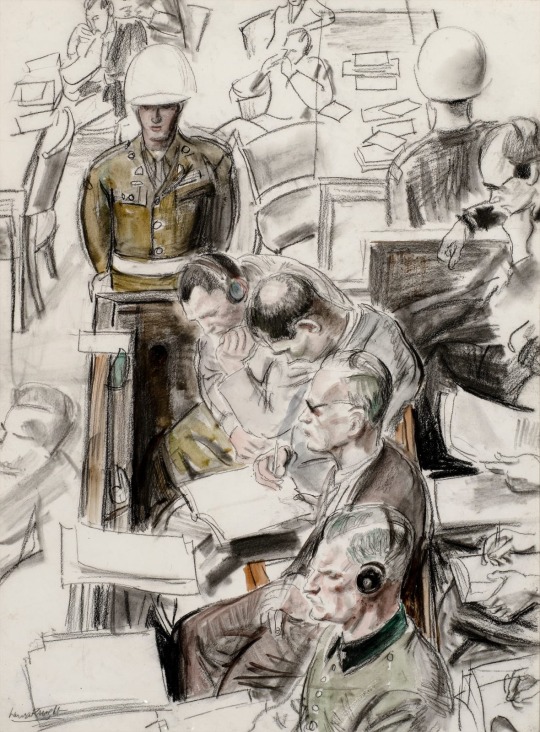
Laura Knight
Nuremberg Trials 1946 Study No. 1
1946
#dame laura knight#laura knight#british painter#british art#nuremberg#wwii#wwii art#war artist#war art#Nuremberg trials
54 notes
·
View notes
Text
I wanted to share this picture of Walter Schellenberg with another SS members in Nuremberg jail (as witnesses), because I haven't seen this here yet.

(I do not support their actions or the ideology.)
#nuremberg#nuremberg trials#reichblr#walter schellenberg#ww2#ww2 germany#germany#world war 2#alfred naujocks
21 notes
·
View notes
Link
Ben Ferencz, the last living prosecutor from the Nuremberg trials, who tried Nazis for genocidal war crimes and was among the first outside witnesses to document the atrocities of Nazi labor and concentration camps, has died. He had just turned 103 in March.
Ferencz died Friday evening in Boynton Beach, Florida, according to St. John's University law professor John Barrett, who runs a blog about the Nuremberg trials. The death also was confirmed by the United States Holocaust Memorial Museum in Washington.
"Today the world lost a leader in the quest for justice for victims of genocide and related crimes," the museum tweeted.
Born in Transylvania in 1920, Ferencz immigrated as a very young boy with his parents to New York to escape rampant antisemitism. After graduating from Harvard Law School, Ferencz joined the U.S. Army in time to take part in the Normandy invasion during World War II. Using his legal background, he became an investigator of Nazi war crimes against U.S. soldiers as part of a new War Crimes Section of the Judge Advocate's Office.
95 notes
·
View notes
Text

Rapport de détention de Wilhelm Keitel – 22 juin 1945
#WWII#après-guerre#after war#les procès#trials#procès de nuremberg#nuremberg trials#wilhelm keitel#22/06/1945#06/1945#1945
8 notes
·
View notes
Text
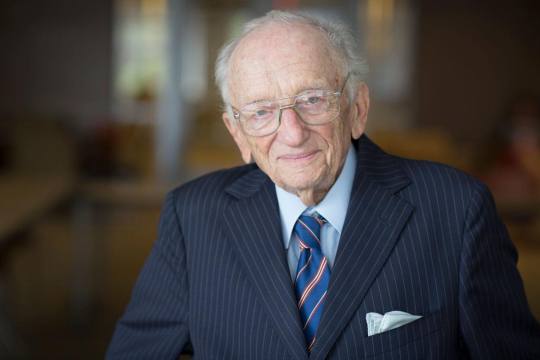
CONDOLENCES: Sgt. Benjamin Ferencz was the last surviving prosecutor of the Nuremberg Trials. Born in 1920 to a Jewish family in Transylvania, Ferencz was 10 months old when his family arrived in the US. After graduating Harvard Law School in 1943, he enlisted in the U.S. Army, landing in Normandy and fighting in the Battle of the Bulge. Ferencz was later transferred to a newly created War Crimes Branch and tasked with collecting evidence of Nazi brutality. He joined the forces that liberated a number of concentration camps, including Buchenwald and Mauthausen. When asked about the haunting scenes he witnessed, Ferencz said he “had peered into hell.” He and his team collected indisputable evidence in Berlin, including the actual death registries. Ferencz was later appointed Chief Prosecutor in the Einsatzgruppen Case, in which 22 members of Himmler’s Einsatzgruppen death squads were charged with murdering over a million Jewish men, women, and children. At age 27, the young attorney’s first case was what many call the biggest murder trial in history. All 22 defendants were convicted and 13 were sentenced to death. Mr. Ferencz, a lifelong advocate for international justice, passed away yesterday at the age of 103.
May his memory be a blessing.
Contributor: Jill G. Mundinger
Humans of Judaism
28 notes
·
View notes
Text
Nuremberg Defendants: Part 1, Alfred Rosenberg - Nazi Philosopher




I've created a new goal for 2024, which is to make posts about the defendants of the Nuremberg Trials. For the sake of the fact that there are already many Tumblr blogs that talk about specific figures from the trials, I won't be making these sort of posts for Göring or Speer. I made one for Hess a couple of months ago in response to an ask I received, which I will link here. These posts will be related to the lesser-talked-about defendants that stood trial and the first of these (because I'll be posting this on his birthday) will be Alfred Rosenberg.
-Alfred Ernst Rosenberg was born on the 12th of January 1893 in Reval (now Talinn), Estonia. His parents died when he was still fairly young and was raised mostly by his two parental aunts.
-What we know about Rosenberg's early life is very limited to what he wrote in his memoirs at Nuremberg. However, what we do know is that he had an elder brother called 'Janny', whose date of death is unknown (he had been arrested by the Soviets). From around his mid-teens he became interested in philosophy. We also know that some of his hobbies included sailing in the summer and ice skating in the winter, and that his nickname given to him by family (or at least referred to by his niece in letters) was 'Freddy'.
-Rosenberg had studied to be an architect and obtained his PhD in 1917. At his stays at home in Estonia he worked as a drawing teacher.
-Rosenberg spent the years of the First World War as a student. He had volunteered to serve in the army but was rejected on the grounds of his nationality. After the revolution in Russia, Rosenberg fled to Munich where he was taken in by Dietrich Eckart.
-Rosenberg had planned to continue with his career in architecture in Munich, but had eventually started working for the far-right newspaper 'Völkischer Beobachter' (English: People's Observer). This paper was sponsored by the Thule Society, a group that which Rosenberg was a member of (and adding onto this, Rosenberg was one of the very first to join the Nazi Party). In 1923 Rosenberg became editor-in-chief of the newspaper.
-Rosenberg, like all of the early members of the party, took part in the Beer Hall Putsch in 1923. Rosenberg had escaped from police and took refuge in the home of an old lady. After the Putsch, Hitler had named Rosenberg as leader of the Nazi movement. This was a tactical move made by Hitler, as Rosenberg was regarded as lazy and was not as dominant as other members of the movement (such as Julius Streicher - who I will be making a post on in the future). Hitler knew that there was no chance of Rosenberg completely taking control of the whole movement, which therefore secured Hitler's leadership, which was restored to him after being released from prison.
-Also in 1923, Rosenberg obtained a divorce from his first wife, Hilda Leesman. Hr married her in 1915, however she was often sick and never followed Rosenberg to Germany. Rosenberg presented himself as the guilty party when obtaining a divorce. His first wife died in 1928 from tuberculosis. Rosenberg married his second wife, Hedwig Kramer, in 1925 and the marriage lasted until Rosenberg's death. Together they had two children: a son that died in infancy, and a daughter, Irene, born in 1930.
-Rosenberg was also often the victim of numerous rumours. For example:
A common rumour was that Rosenberg was in fact Jewish. His last name obviously didn't help with these rumours. He also didn't put in much effort to clarifying his ethnic background (but this was to keep the rest of his family - occupied by the Soviets - safe).
A rumour spread mostly by Hermann Göring was that Rosenberg had been working as a French spy during World War 1.
Another rumour was that he had an “unsavoury romantic life” which included him attending orgies of both men and women. This was a rumour spread by Ernst Hanfstaengl. Hanfstaengl gives no source for this, however he is also incredibly biased against Rosenberg so we can also assume that this was made up.
-Rosenberg is most well-known for his book “The Myth of the 20th Century”. This book shows us his ideas of National Socialist philosophy, a form of National Socialism which he later claimed was never truly realised. The Myth sold around 1 million copies by the end of the Second World War. The book at the time was not translated into any other languages, as per Rosenberg's request, although a refined version was written by Rosenberg for use in schools (however Rosenberg personally disagreed with this too, believing it was for the youth themselves to develop their own ideas). It's also interesting that Hitler personally disliked The Myth. He claimed that it was something that ordinary people would not understand and made digs at Rosenberg's Baltic background.
-An important part of Rosenberg's ideology was his fierce anti-Christianity, especially in regards to the Catholic Church. Rosenberg himself was raised Protestant but believed there to be no need for Christianity, and also believed that Christianity was gradually dying out.
-Upon the Nazi's coming to power, Rosenberg's primary role was related to being the party's chief ideologist. This role undoubtedly had its limits. A specific example was the amount of real influence he had over schools. Rosenberg had no direct influence over schools and other party officials made sure that he could not intervene in schools. His desired plans for 'Hohe Schule' eventually had to be abandoned.
-In the Second World War, Rosenberg was given a big role, being made Reichsminister für die besetzten Ostgebiete (English: Reich Minister for the Eastern Occupied Territories) after Germany had made successful advances in the East. However, once again, Rosenberg's role was limited. He was constantly blocked by other party members (including Reichsmarschall Hermann Göring, Minister for Occupied Ukraine Erich Koch, Hitler's private secretary Martin Bormann, as well as constant battle over authority with foreign minister Joachim von Ribbentrop).
-Rosenberg's position on the governance of the Eastern Territories was different to that of Erich Koch. Where Koch saw dictatorial opportunities in Ukraine, Rosenberg saw an opportunity to break up the USSR and allow for self-governance of the eventual newly-created states.
-Rosenberg was personally horrified by the treatment of Slavic peoples during the war and there are moments in which he intervened (as best as he could). There is no evidence that he intervened on behalf of Jews, but Dr Otto Bräutigam recorded an occasion where Rosenberg condemned 'wild excesses' against Jews in Russia (however this does not mean that his opinions on Jews and anti-semitism had suddenly changed, they did not). Rosenberg had a principle that some ethnic groups were 'more deserving' than others, and this basis had saved lives of prisoners of war by getting separate camps set up for them and sending out inspectors to tour them. Although Rosenberg's motives were often not clear, his interventions were usually on the side of sanity and in some cases humanity.
-After the failures of Stalingrad and when territory in the East began to erode, Rosenberg's role as Minister for the Occupied Eastern Territories became increasingly meaningless. Only in 1944 did Rosenberg pluck up the courage to send a letter of resignation to Hitler, however Hitler did not bother to respond to this letter. It's suggested that if Rosenberg had resigned in 1943 (as advised by the staff that worked under him), it's likely that he would have been spared by the hangman's noose.
-Prior to his capture in May 1945, Rosenberg had considered committing suicide along with the rest of his family to avoid capture by the Russians. He had acquired enough cyanide for himself, his wife and his daughter. However, Rosenberg had a change of heart, apparently throwing the cyanide into the sea at Flensburg (according to his Nuremberg memoirs). After this Rosenberg had sprained his ankle (throughout adulthood he always had problems with his foot) and had to be taken to a military hospital where Rosenberg then gave himself up to the Allies. Albert Speer claims that Rosenberg was drunk when he sprained his ankle, however Speer was not present nor did he provide a source for this information. Rosenberg claims that he was not drunk but had to be carried.
-In the Nuremberg Trials Rosenberg was defended by Dr Alfred Thoma. Rosenberg's examinations by the prosecutors at Nuremberg are fairly awkward. For example, the Russian prosecutor M. Y. Raginsky gave a description of Rosenberg's authorisation of the removal to the Reich in 1944 of 40,000 homeless Russian orphans (this is something I will refer back to again shortly), but the prosecutor fell silent when Rosenberg alleged that a similar number of adults had been deported to the USSR in 1940 from the states of Latvia and Estonia. US prosecutors also had their awkward moments, for example Thomas Dodd who heatedly accused Rosenberg of persecuting religion.
-Coming back to my mention of the removal of Russian orphans to the Reich: although Rosenberg could not deny that he authorised the removal, to Rosenberg's credit he could maintain that he had cared of the wellbeing of the children and had visited the camp near Dessau. Dr. Thoma insisted that Rosenberg took charge of them at the personal request of Field-Marshall von Kluge, who feared that they would otherwise fall into the hands of Fritz Sauckel. There is also confusion of the numbers involved. The Russian prosecutor alleged 40,000 orphans; whereas Dr. Thoma admitted to 20,000. However, expert opinion now suggests that the real figure was somewhere between 2,500 to 3,000 orphans.
-Rosenberg followed trial proceedings very closely whenever it concerned him personally. On several occasions while being examined but the Russians, he tried to intervene to check the the translation, which he claimed to be distorting what he had said. Whenever he wasn't being examined, he tended to lose interest and spent his time making pencil sketches of witnesses.
-Although Dr. Thoma did his best, Rosenberg's defence was handicapped for a number of reasons. One of the main reasons was that documents and witnesses were provided at the indulgence of the prosecution. Rosenberg had tried to call a witness to testify on behalf of his work in German-English relations, however there was o response. Another reason is that Rosenberg himself gave complicated answers when being examined, so much so that even Dr. Thoma had asked him to be more concise.
-Rosenberg was found guilty on all four counts of the indictment of the tribunal and was sentenced to death by hanging. Upon the scaffold when asked if he had any last words Rosenberg said “no”, being the only criminal condemned to the gallows to have no last words. Rosenberg was hung in the early hours of October 16th, 1946.
37 notes
·
View notes
Text
💉💉💉THE SPANISH FLU GENOCIDE 💉💉💉
😷💉⚰️
#spanish flu#seasonal flu#healthcare#health#masks#danger#warning#doctors#nurses#be wear#military tribunals#nuremberg trials#crimes against humanity#corruption#depopulation agenda#genocide#silent wars#organised crimes#criminals in power#speaktruth#fight for justice#standup#speak up#truth#please share#wwg1wga
36 notes
·
View notes
Text
The Nuremberg trials established the principle that neither “obeying the law” nor “following orders” is a sufficient legal defense for those accused of violating basic standards of civilization.
In 1948, the Universal Declaration of Human Rights spelled out a framework for holding governments accountable, followed in three years by the Convention on the Prevention and Punishment of Genocide.
In the 1970s and ’80s, international sanctions were lodged against racist Rhodesia and South Africa, ultimately transforming both countries. In the same period, the United States and the EU began making respect for human rights a condition of foreign military assistance.
During the Bosnian conflict, an international tribunal was established to prosecute the perpetrators of crimes against humanity. I was a firm advocate of the tribunal because only through a judicial process is it possible to establish individual culpability for crimes that might otherwise be attributed to an entire group— and nothing does more to trigger additional cycles of violence than perceptions of collective guilt. Among those indicted by the tribunal was Milošević, who was charged with genocide in Bosnia and the forced deportation of hundreds of thousands of people from Kosovo.*
#book: facism a warning#nuremberg trials#genocide#rhodesia#south africa#justice#bosnia#international tribunal#kosovo#deportation#slobodan milosevic
2 notes
·
View notes
Text
Astounding that books from 1954 predicted "allied war crimes" whataboutism
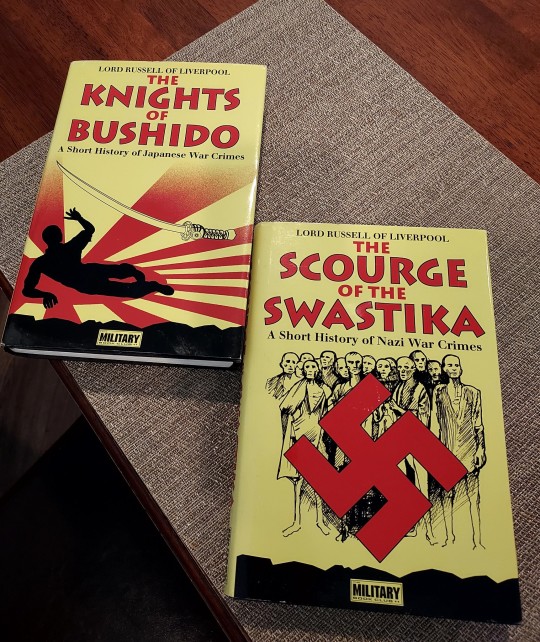
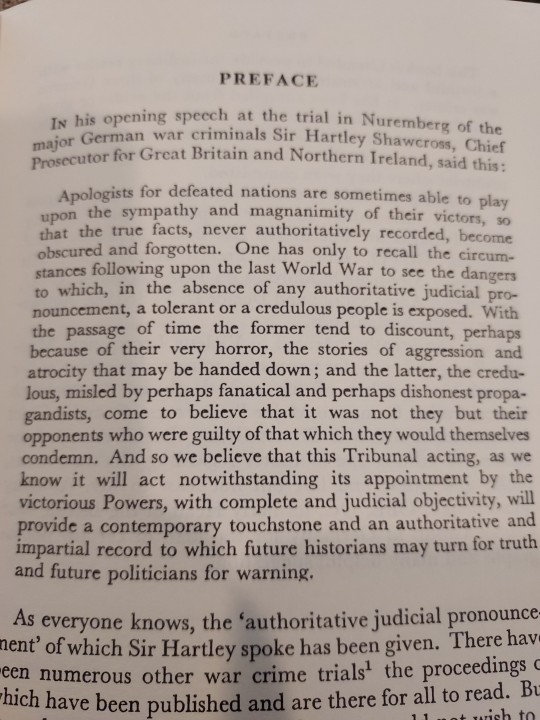
#war crimes#world war 2#nazi germany#imperial japan#books#lord russell of liverpool#nuremberg trials
21 notes
·
View notes